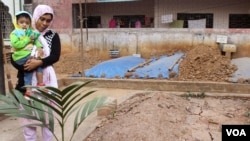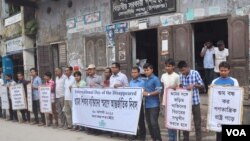A Bangladesh court verdict, in which 16 former members of Bangladesh’s Rapid Action Battalion (RAB) were handed death sentences for their involvement in the 2014 murder of seven people, has received mixed reactions.
The court found 35 men, including 25 former RAB officials, guilty of the abduction and murder of a city mayor and leader of Bangladesh’s ruling Awami League (AL) party and his six other companions from Narayanganj. In the case, known as Narayanganj 7, the court handed down the death penalty to 26 of the convicts, who included 16 RAB members.
The country’s home minister Asaduzzaman Khan Kamal said that the verdict has been welcomed by the country.
“None, including member of any law and order enforcement agency, will be spared after committing such crime. Nobody is above the law. This verdict sends out that stern message to all,” Kamal said.
Some relatives of the murdered men said that they are satisfied with the sentences in the case.
“They ruined my family life. I want a quicker execution of the court order,” Selina Islam, wife of the murdered mayor and AL leader, Nazrul Islam, told VOA.
But relatives of other victims of enforced disappearances and murders said the verdict does not trigger much hope in their cases.
“In little over two years the trial of the Narayanganj 7 case is over, perhaps because the main victim was politically powerful. I am a poor street hawker. In my son’s 5-year-old case, the government has not begun the trial as yet,” Ruhul Amin told VOA, referring to the 2012 case of his son Mohammad Imam Hassan, who allegedly disappeared while in RAB custody. “I doubt if I shall ever get justice.”
Powerful Interests
The court ruled Nur Hossain, an expelled AL leader in Narayanjanj, hired RAB members to abduct and kill his political rival Nazrul Islam for political and business interests.
Islam and six other men were abducted on April 27, 2014. Three days later, bodies of the seven men were found floating in a nearby river.
Since its establishment as a counter-terrorism force in 2004, the RAB, which is led by officers from the army and other security agencies, has been accused by local and global groups of indulging in serious human rights abuses, including enforced disappearances and murders, often locally known as “cross-fire deaths”.
This is the first time that RAB members have been convicted and sentenced in any case related to an enforced disappearance and murder.
Dhaka-based security analyst retired Brigadier General Sakhawat Hossain views the latest verdict as a “positive” step in the government’s attempt to bring related cases to justice.
“Many people perhaps lost faith in the justice system. This verdict will help restore people’s faith in the judiciary. Now many members of the security agencies, including the elite forces, will perhaps restrain themselves from being involved in such heinous crimes,” Hossain told VOA.
But opposition Bangladesh Nationalist Party (BNP) leader AKM Wahiduzzaman said that he is not “so hopeful” about the execution of Monday’s court orders.
“The orders against different defendants have come from a lower court. They will surely appeal the verdicts in the High Court, and later, even the Supreme Court. We cannot be sure now if the sentences handed out in the lower court will be upheld in the higher courts later,” Wahiduzzaman told VOA.
The BNP leader said that the government fast-tracked the Narayanganj 7 case because the main victim in the case was a ruling party leader.
“About 80% of the people, who have been victims of enforced disappearances in Bangladesh in the past eight years are opposition party leaders, workers and their relatives,” Wahiduzzaman said.
“The government has not shown much interest to properly process any of those cases to bring the perpetrators to justice.”
Long History
Allegations of enforced disappearances began surfacing in Bangladesh after Prime Minister Sheikh Hasina Wazed formed the AL-led government in 2009.
According to the Bangladeshi human rights group Odhikar, at least 326 people have vanished through enforced disappearances in the country in the past eight years, with 42 found dead, 162 arrested or returned alive, and the whereabouts of 122 remain unknown.
Another Bangladeshi rights group, Ain-o-Salish Kendra (ASK), counted at least 97 victims of enforced disappearances last year, up from 55 in 2015.
ASK’s executive director Nur Khan said that his group strongly suspects law enforcement agencies, including RAB, had been involved in many enforced disappearances cases.
“The government should set up a judicial commission to properly investigate all the related allegations leveled against RAB and other forces. That commission should be tasked to identify the culprits and bring them to justice. Otherwise, this culture of enforced disappearances and extrajudicial killings, which began 10 or 15 years ago, will not end,” Khan told VOA.
Phil Robertson, deputy director of Asia Division of Human Rights Watch, said that the Bangladesh government should make these convictions a turning point for the way RAB operates, and send a clear message to the force’s commanders and rank-and-file officers alike that anyone found violating rights will be severely punished without exception.
“This case is just one of many cases where the RAB have been involved in enforced disappearances and extra-judicial killings, which they try to excuse away as so-called “cross-fire” deaths. When ordinary Bangladeshis with neither money nor connections are taken away by the RAB, all they can hope for is mercy. Ask the man on the street – being led away by the RAB is seen as a death sentence,” Robertson told VOA.






